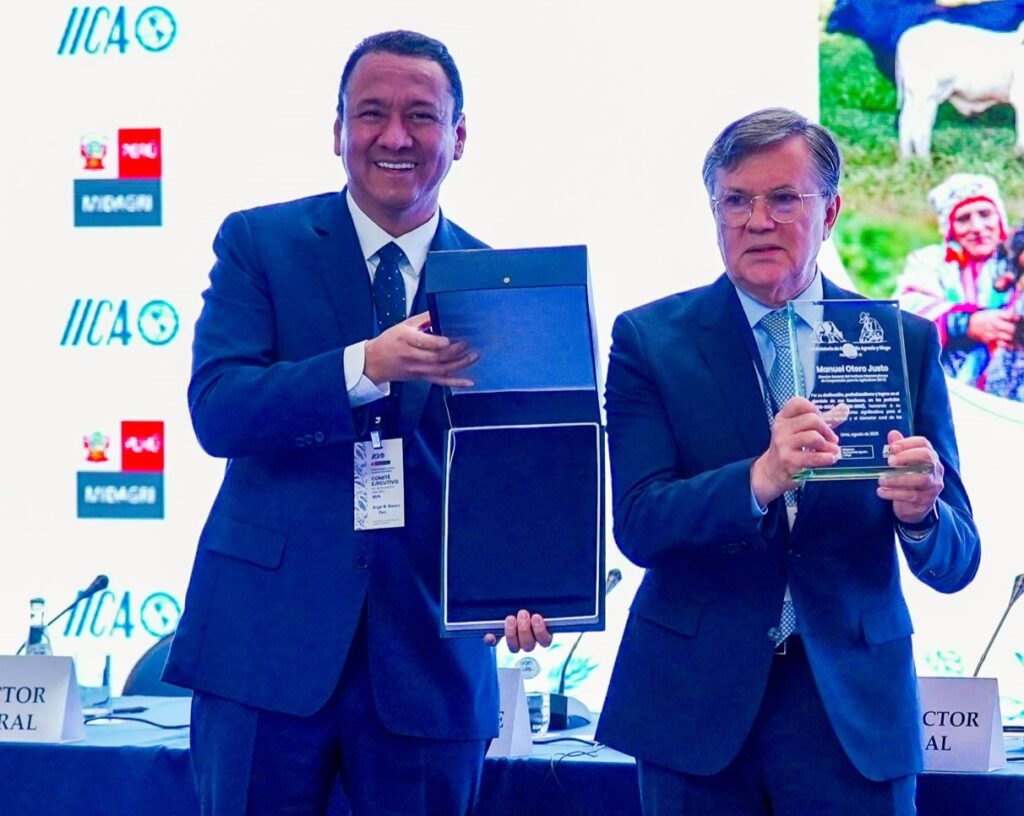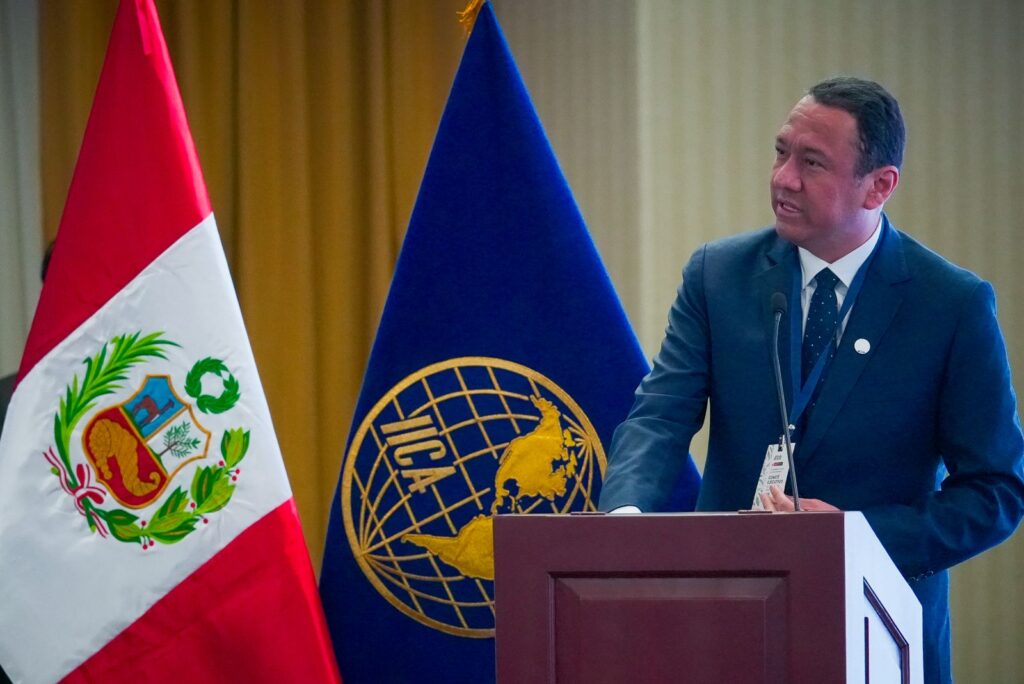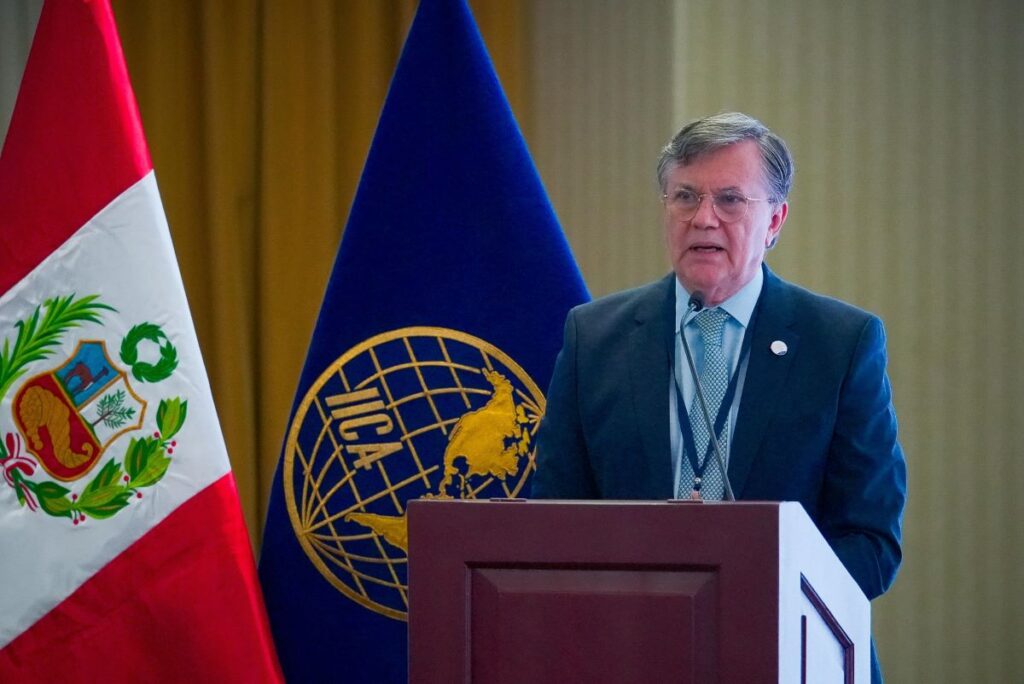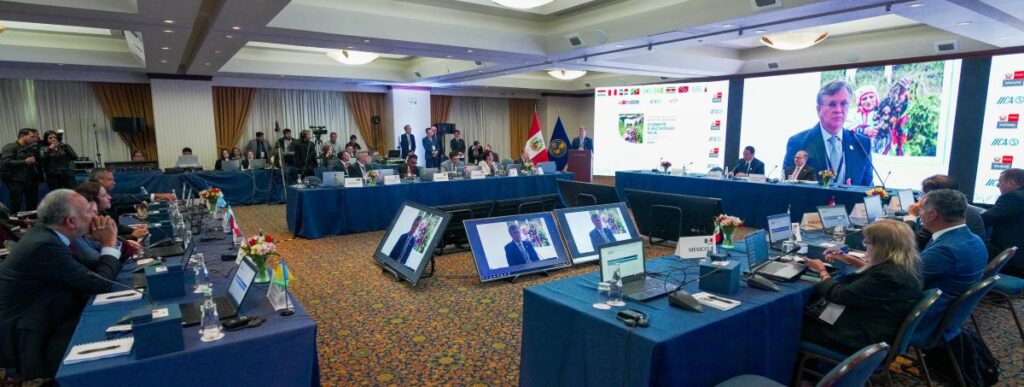
Lima, 20 August 2025 (IICA) – Ministers and senior officials of the agriculture sector of the Americas opened the 45th Regular Meeting of the Executive Committee of the Inter-American Institute for Cooperation on Agriculture (IICA) with a joint message on the importance of animal production to the hemisphere’s economic development and global food security.
On the first day of the meeting, the government representatives of the countries agreed that the production and consumption of nutrient-rich food of animal origin, such as meat, milk and eggs, play a vital role in the food systems of the Americas and the world.
Ángel Manero Campos, Minister of Agricultural Development and Irrigation of Peru, and Manuel Otero, Director General of IICA, formally opened the meeting, which will take place over two days, bringing together representatives of the private sector and agricultural research institutions, delegates from observer countries, and members of other international organizations and the accredited diplomatic corps in Lima.
The IICA Executive Committee, which meets once per year, is a strategic oversight body of the hemispheric organization for agricultural development and rural well-being. The Committee determines the overall thrust of the organization’s technical cooperation projects in the hemisphere. It consists of twelve Member States, elected for a two-year term, based on the criteria of partial rotation and equitable geographic distribution.
Ministers attending the meeting in Lima include Víctor Carvajal, from Costa Rica; Julian Defoe, from Dominica; Indar Weir, from Barbados; Laura Suazo, from Honduras; María Fernanda Rivera, from Guatemala; and Saboto Caesar, from Saint Vincent and the Grenadines.
Ministers Floyd Green, from Jamaica; Luis Alfredo Fratti, from Uruguay; Martha Carvajalino, from Colombia; and Zulfikar Mustapha, from Guyana, are participating virtually.
During the opening ceremony, Minister Manero presented a plaque to the IICA Director General, on behalf of the Peruvian Government, in recognition of his contributions to agricultural productivity and sustainability, and to rural retention.
The current IICA Executive Committee members are Argentina, Bolivia, Costa Rica, Dominica, Jamaica, Mexico, Panama, Paraguay, Saint Lucia, the United States and Uruguay.
The governments of Brazil, Canada, El Salvador, Grenada, Guyana and the Dominican Republic have also sent delegations to the meeting.

A more than eighty-year commitment
In welcoming the participants, Manero Campos highlighted IICA’s more than eighty-year commitment to rural development, integration and agricultural trade in the Americas, as well as to global food sustainability.
The host minister noted that, “Since 1942, IICA has been the main joint institutional platform for agriculture for the countries in this hemisphere and we have reaped tangible benefits through our membership in the organization. We have experienced difficult years and prosperous years, but IICA has always been by our side”.
Furthermore, he stressed that, “Peru has been an agricultural country from its birth. One third of the economically active population works in agriculture and therefore it is an extremely important sector for the country. We have a tradition of livestock production, and we produce crops found nowhere else in the world”.
Manero Campos explained that livestock production in Peru and the rest of Latin America and the Caribbean needs to enhance its sustainability and also to give greater recognition to the activity of small farmers. “If we want to continue improving, we need innovation, technology and knowledge. The support of IICA is essential in all these areas”, he said in closing.
Manuel Otero presented a brief overview of the sustainable livestock projects that IICA is currently undertaking with strategic partners in various countries in the region.
“Livestock farming”, he said, “is one of the pillars of our economies. It accounts for 50% of agricultural GDP and involves an important social dimension, given that 38 million farmers depend on it for their livelihood. There are unequivocal signs that the global demand for food of animal origin will continue to increase up to 2050. No one can afford to miss this opportunity”.
The IICA Director General urged countries of the Americas to chart a course for the next 25 years: “In our agriculture sector, we must make the changes we ourselves decide to make with science and innovation, not those others try to impose on us from the outside”.
Otero also applauded the drafting of a joint message by countries of the Americas on the importance of animal production, noting that “it demonstrates that we are putting aside our minor differences to tell the world what unites us and build the consensus we need”.

Shared principles
The ministers took part in five high-level technical panels in which officials and experts from the research, academic, productive and industrial sectors discussed topics such as technological impact, economic dimensions, trade and environmental issues, and animal health in livestock farming in the Americas.
The ministers and panelists agreed on a series of principles that they collectively support and that reflect their vision for healthy, economically viable and environmentally responsible animal production systems.
They expressed their commitment to increasing the production of safe, nutritious and traceable food of animal origin and to furthering the implementation of science-based livestock farming technologies and practices in the hemisphere.
The ministers discussed ways to provide producers with tools that would allow for meeting the growing global demand for food of animal origin while protecting natural resources. The participants agreed that innovation, whether through improved genetics, advances in nutrition, veterinary products, or new information technologies, must be science-based and tailored to local needs.
The ministers and officials from the Americas shared their countries’ experiences with well-managed livestock systems that provide environmental benefits and ecosystem services, while also contributing to productivity and resilience.
They also referred to the central role that trade plays in food security and economic growth, and stressed the need to prioritize animal health in political and technical agendas. In that regard, they noted that protecting animal health reduces poverty, protects public health, and preserves the livelihoods of rural communities.
On Wednesday, during the second day of the meeting, the three candidates for the position of IICA Director General for the period 2026-2030 will deliver presentations on their proposed programs: Muhammad Ibrahim, of Guyana; Laura Suazo, of Honduras, and Fernando Mattos, of Uruguay.
The meeting will also include presentations on the status of projects carried out within the framework of the Hemispheric Partnership for Food Security and Sustainable Development, presented by IICA in 2023, and on progress achieved by the Living Soils of the Americas program and the Hemispheric Fund for Agricultural Resilience and Sustainability (FoHRSA), which has already secured an initial investment of two million dollars for six strategic projects.

More information:
Institutional Communication Division.
comunicacion.institucional@iica.int











